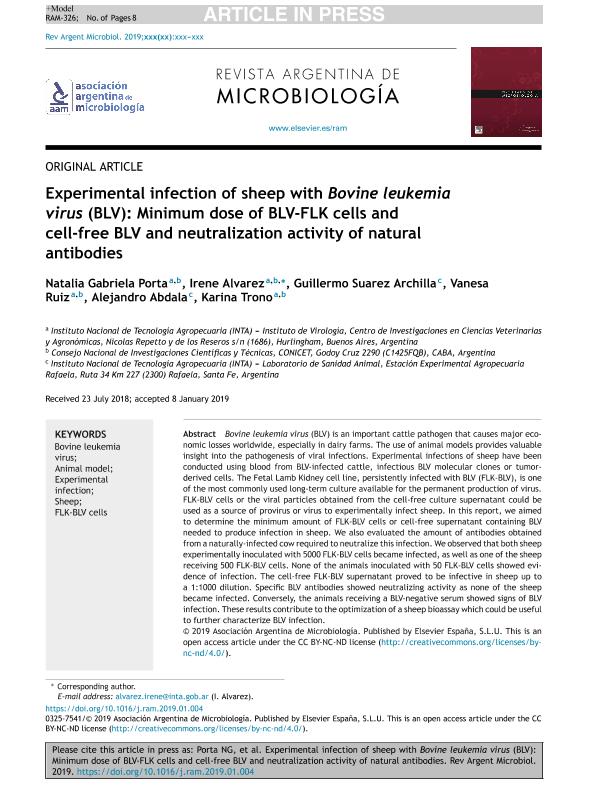Artículo
Bovine leukemia virus (BLV) is an important cattle pathogen that causes major economic losses worldwide, especially in dairy farms. The use of animal models provides valuable insight into the pathogenesis of viral infections. Experimental infections of sheep have been conducted using blood from BLV-infected cattle, infectious BLV molecular clones or tumor-derived cells. The Fetal Lamb Kidney cell line, persistently infected with BLV (FLK-BLV), is one of the most commonly used long-term culture available for the permanent production of virus. FLK-BLV cells or the viral particles obtained from the cell-free culture supernatant could be used as a source of provirus or virus to experimentally infect sheep. In this report, we aimed to determine the minimum amount of FLK-BLV cells or cell-free supernatant containing BLV needed to produce infection in sheep. We also evaluated the amount of antibodies obtained from a naturally-infected cow required to neutralize this infection. We observed that both sheep experimentally inoculated with 5000 FLK-BLV cells became infected, as well as one of the sheep receiving 500 FLK-BLV cells. None of the animals inoculated with 50 FLK-BLV cells showed evidence of infection. The cell-free FLK-BLV supernatant proved to be infective in sheep up to a 1:1000 dilution. Specific BLV antibodies showed neutralizing activity as none of the sheep became infected. Conversely, the animals receiving a BLV-negative serum showed signs of BLV infection. These results contribute to the optimization of a sheep bioassay which could be useful to further characterize BLV infection. El virus de la leucosis bovina (bovine leukemia virus [BLV]) es un importante agente patógeno del ganado que causa importantes pérdidas económicas en todo el mundo, especialmente en los rodeos lecheros. El uso de modelos animales proporciona información valiosa sobre la patogénesis de las infecciones virales. Se realizaron infecciones experimentales en ovejas usando sangre de bovinos infectados con BLV, clones moleculares de BLV infecciosos o células derivadas de tumores. La línea celular Fetal Lamb Kidney, persistentemente infectada con el BLV (FLK-BLV), es uno de los cultivos a largo plazo más utilizados para la producción permanente de virus. Las células FLK-BLV o las partículas virales obtenidas del sobrenadante del cultivo libre de células podrían usarse como fuente de provirus o de virus para infectar experimentalmente ovejas. En este trabajo, nuestro objetivo fue determinar la cantidad mínima de células FLK-BLV o de sobrenadante libre de células que contiene BLV necesaria para producir infección en ovejas. También evaluamos la cantidad de anticuerpos bovinos anti-BLV necesaria para neutralizar la infección. Observamos que las dos ovejas inoculadas experimentalmente con 5000 células FLK-BLV se infectaron, y que una de las dos ovejas que recibieron 500 células FLK-BLV se infectó. Ninguno de los animales inoculados con 50 células FLK-BLV mostró evidencia de infección. El sobrenadante FLK-BLV libre de células demostró ser infectivo en ovejas hasta la dilución 1:1000. Los anticuerpos BLV específicos mostraron actividad neutralizante, ya que ninguna de las ovejas se infectó. Por el contrario, los animales que recibieron un suero BLV negativo mostraron signos de infección por BLV. Estos resultados contribuyen a la optimización de un bioensayo en ovejas útil para caracterizar la infección por BLV.
Experimental infection of sheep with Bovine leukemia virus (BLV): Minimum dose of BLV-FLK cells and cell-free BLV and neutralization activity of natural antibodies
Título:
Infección experimental en ovinos con el virus de leucosis bovina: dosis mínima de células BLV-FLK y virus libre de células, y actividad neutralizante de anticuerpos naturales
Porta, Natalia Gabriela ; Alvarez, Irene
; Alvarez, Irene ; Suarez Archilla, Guillermo; Ruiz, Vanesa
; Suarez Archilla, Guillermo; Ruiz, Vanesa ; Abdala, Alejandro; Trono, Karina Gabriela
; Abdala, Alejandro; Trono, Karina Gabriela
 ; Alvarez, Irene
; Alvarez, Irene ; Suarez Archilla, Guillermo; Ruiz, Vanesa
; Suarez Archilla, Guillermo; Ruiz, Vanesa ; Abdala, Alejandro; Trono, Karina Gabriela
; Abdala, Alejandro; Trono, Karina Gabriela
Fecha de publicación:
04/2019
Editorial:
Asociación Argentina de Microbiología
Revista:
Revista Argentina de Microbiología
ISSN:
0325-7541
e-ISSN:
1851-7617
Idioma:
Inglés
Tipo de recurso:
Artículo publicado
Clasificación temática:
Resumen
Archivos asociados
Licencia
Identificadores
Colecciones
Articulos (IVIT)
Articulos de INSTITUTO DE VIROLOGIA E INNOVACIONES TECNOLOGICAS
Articulos de INSTITUTO DE VIROLOGIA E INNOVACIONES TECNOLOGICAS
Citación
Porta, Natalia Gabriela; Alvarez, Irene; Suarez Archilla, Guillermo; Ruiz, Vanesa; Abdala, Alejandro; et al.; Experimental infection of sheep with Bovine leukemia virus (BLV): Minimum dose of BLV-FLK cells and cell-free BLV and neutralization activity of natural antibodies; Asociación Argentina de Microbiología; Revista Argentina de Microbiología; 51; 4; 4-2019; 316-323
Compartir
Altmétricas



